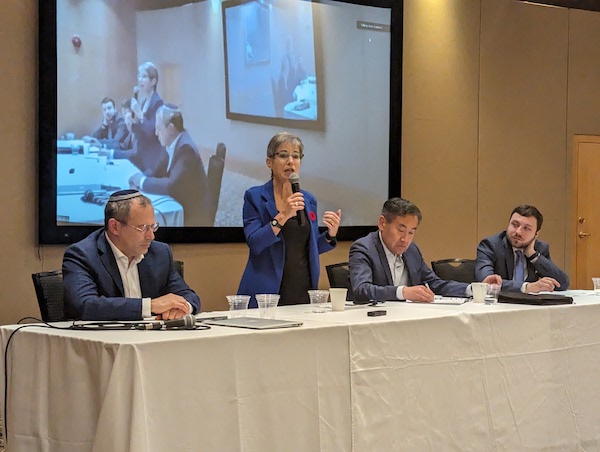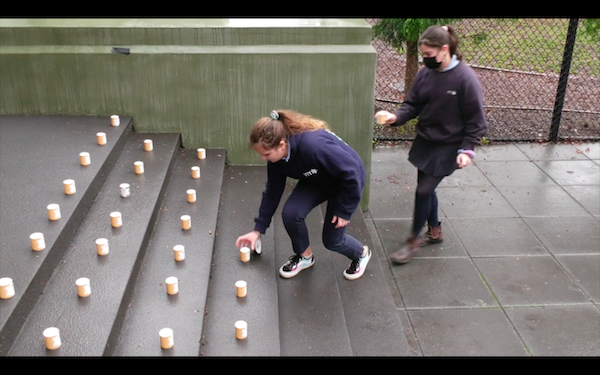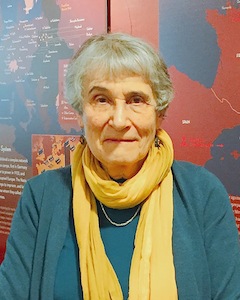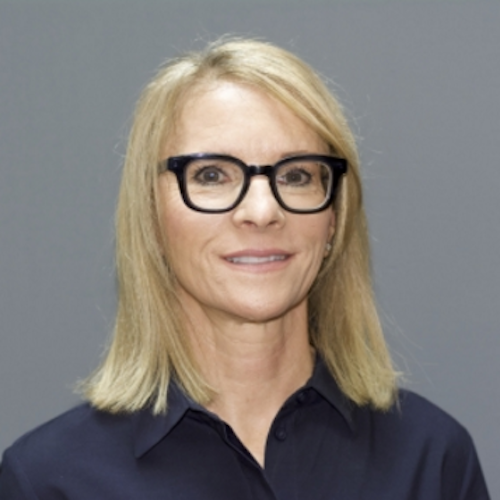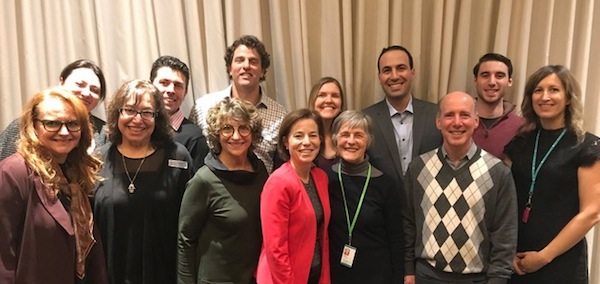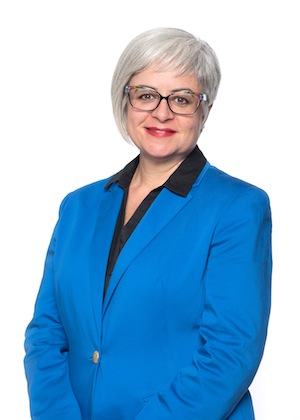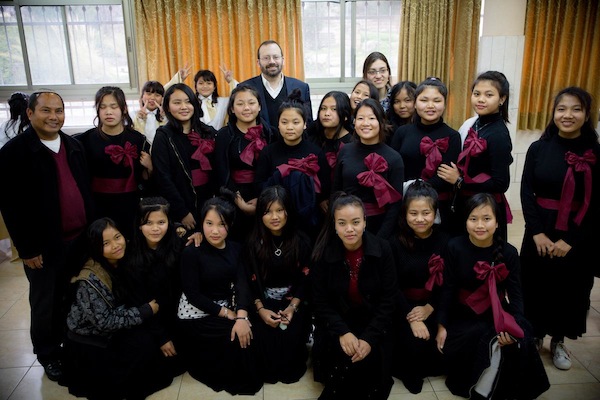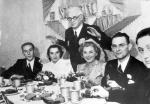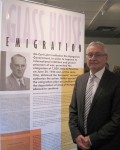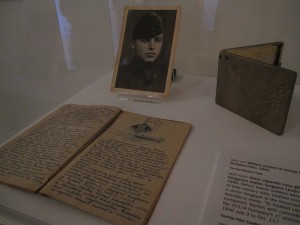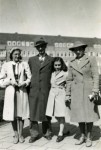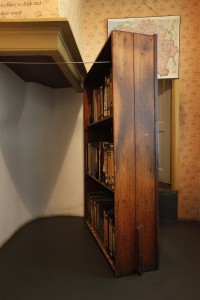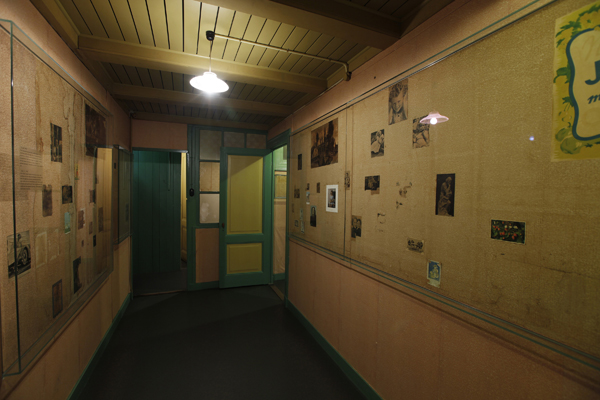BC cabinet minister Selina Robinson speaks Nov. 5 at Schara Tzedeck Synagogue. Other panelists at the B’nai Brith Canada event that day were, left to right, Schara Tzedeck’s Rabbi Andrew Rosenblatt, BC United MLA Michael Lee and Aron Csaplaros, BC regional manager for B’nai Brith. (photo by Pat Johnson)
British Columbia is to become only the second province in Canada to mandate Holocaust education in the school curriculum. In a surprise announcement at the Jewish Community Centre of Greater Vancouver on Oct. 30, BC Premier David Eby was flanked by Jewish community leaders and survivors of the Holocaust when he said that Grade 10 students will be required to learn about the Holocaust, beginning in the 2025-26 school year.
Until now, it was possible for a student to graduate from the school system in British Columbia without ever having encountered the subject. Teachers have discretion to include the Holocaust in social studies classes and an elective on genocide is available in some schools, but there was no universally mandated requirement for learning about the Shoah. Ontario recently instituted mandatory Holocaust education at the Grade 6 level, becoming the first province in the country to make the subject compulsory.
Speaking at an event on Nov. 5, BC cabinet minister Selina Robinson recounted how the milestone decision unfolded. She credits former BC education minister (now minister of transportation and infrastructure) Rob Fleming with launching the idea in 2018. Fleming came to Robinson and asked if she knew that Holocaust education was not mandatory.
“Just like many, many others, I was surprised to learn that,” said Robinson. “He started the ball rolling.”
The COVID pandemic derailed the plans, as educators and administrators struggled to simply deliver learning to kids.
It was while reading Vancouver author Marsha Lederman’s book Kiss the Red Stairs that Robinson, who is the province’s minister of post-secondary education and future skills, wondered what had happened with Fleming’s idea.
“So, I picked up the phone and I called Rachna [Singh, the current minister of education] and then I called Rob Fleming and then I called a couple of my other colleagues who had an interest in seeing this move forward,” she recounted. “And then I called the premier and I said, David, this project that we started is moving at a snail’s pace and this needs to get done. We cannot wait any longer. I want to give kudos to our premier, to David Eby. He said, I’m on it.”
Robinson was speaking at Schara Tzedeck Synagogue on Sunday as part of a panel on antisemitism and Holocaust education organized by B’nai Brith Canada. Numerous members of the legislature, as well as mayors, councilors and school trustees from around the province joined the event virtually. Robinson’s fellow panelists were BC United MLA Michael Lee and Schara Tzedeck’s Rabbi Andrew Rosenblatt. Aron Csaplaros, BC regional manager for B’nai Brith Canada, moderated, with senior leaders from B’nai Brith beaming in from Eastern Canada.
From Robinson’s post-COVID jumpstarting of the Holocaust education planning, things leapt forward, she said.
“It really moved, I would say, from June until probably the beginning of September, at lightning speed – and anyone who’s ever had to work with government knows that nothing ever moves at lightning speed,” Robinson said. “So, I want to give kudos to our partners at the Vancouver Holocaust Education Centre and CIJA [the Centre for Israel and Jewish Affairs] and [the Jewish Federation of Greater Vancouver] for coming together and working in partnership. I know that B’nai Brith is new on the scene [in BC] and this is a very important piece, but I also think it’s really important to recognize those that have been working … for a number of years to make this happen.”
The timing of the announcement, in the weeks after the Oct. 7 terror attacks in Israel and in the midst of a massive spike in antisemitism worldwide, was coincidental. The issues, though, are related.
Robinson said the provincial government has been vigilant in monitoring antisemitism and potential for violence in British Columbia. She credited Minister of Public Safety and Solicitor General Mike Farnworth for spearheading the response.
“He called me every single day from Oct. 7 for about 10 days, to report in to me about what was happening on the ground,” she said. In addition to her official role with advanced education, Robinson said she is known among colleagues as “the Jew in the crew,” as the provincial elected official who is most publicly visible in her Jewishness.
On Nov. 1, Robinson convened a meeting of the heads of the 25 post-secondary institutions in the province.
“I got agreement from all 25 presidents that they would do everything within their power to make sure that everyone felt safe on their campuses,” she said. “I don’t think solving that is going to be an easy task, but it’s absolutely a requirement of all of them, because, in this province and in this country, we believe that everybody has the right to be who they are and to feel safe and, if it’s not happening, then we need to fix it.”
A bipartisan love-in that has been going on between Robinson and Lee, who represents Vancouver-Langara (the provincial constituency that includes many of Vancouver’s Jewish institutions and residents), continued Sunday in the obvious respect and affection between the two MLAs despite party lines. Lee made the news last week after rising in the house to give a personal tribute to Robinson’s strength as a leader who is Jewish in this challenging time and Robinson reciprocated kind words at the B’nai Brith event.
“Michael Lee has been a steadfast supporter, not just in this particular situation,” she said. “But also [to me] as a Jewish person who is having her own experience as a Jew around what is happening.”
Robinson spoke emotionally about the impacts of current events on her family, which includes her Israeli soon-to-be son-in-law, who became a permanent resident of Canada at the end of September.
Making Holocaust education a mandatory part of the province’s education curriculum has been a dream of the people at the Vancouver Holocaust Education Centre since the organization was founded, in 1994, according to Nina Krieger, the VHEC’s executive director.
“I think stars aligned and David Eby acknowledged Selina Robinson as being a key driving force in this initiative,” Krieger told the Independent.
A process of consultation will now begin and Krieger expects her agency will be central to that work, identifying and providing resources to help craft the new curriculum, which is likely to be a component of the Social Studies 10 learning outcomes.
“Certainly we bring a wealth of experience and a roster of programs and resources and best practices that will be relevant to the curriculum development process,” she said. “We are also poised to work with the minister of education to play whatever role is needed for that process. Also, we know the implementation and resource tools and training that teachers are going to need will be really important as well, so we’re looking forward to supporting the province and the teachers directly with that.”
The Jewish Federation and CIJA will continue to be engaged with the planning for mandatory Holocaust education. Both organizations issued statements after the announcement Oct. 30.
“When left unchecked, antisemitism culminates in some of the darkest chapters in human history. By learning from the Holocaust, we honour the memories of its victims and, we hope, contribute to preventing future tragedies,” said Ezra Shanken, Federation’s chief executive officer. “Today’s announcement shows the BC government’s commitment to creating a safer society for all.”
“Education is key to ensuring that our children learn to combat hate and that the Jewish community can live in a safer province,” said Nico Slobinsky, CIJA’s vice-president for the Pacific Region. “We look forward to working with the BC government on implementing mandatory Holocaust education in our province’s K-12 curriculum.”
At Sunday’s event, Marvin Rotrand, national director of B’nai Brith’s League of Human Rights, speaking virtually from Montreal, noted that 15 US states have some form of mandatory Holocaust education – and early indications from studies in those jurisdictions indicate a decrease in hate crimes not only toward Jews but other groups as well.

